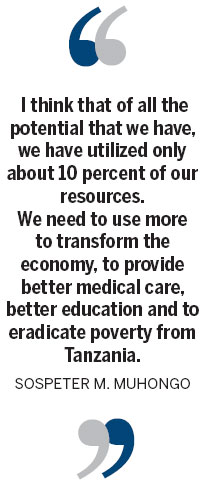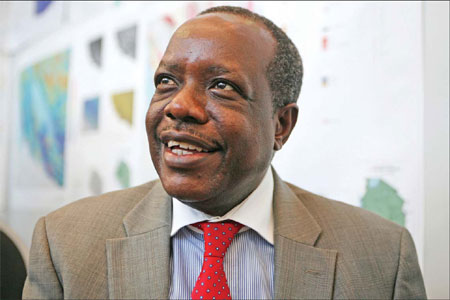Tanzania wants to power ahead
Updated: 2013-03-08 08:53
By Andrew Moody (China Daily)
|
|||||||||||
|
Sospeter M. Muhongo says Tanzania's resources are vital for it to achieve its Vision 2025 target to become a middle-income country. Mark Wessels / for China Daily |

Energy and minerals minister seeks overseas investment to realize tremendous potential
Sospeter M. Muhongo is rare among politicians in that he is an acknowledged expert on his ministerial brief.
The 58-year-old former president of the Geological Society of Africa was appointed last May as Tanzania's minister of energy and minerals by President Jakaya Mrisho Kikwete.
"This is the way we are going now. I think, depending on our new constitution, it is very likely that experts will be deployed in some positions if it is thought they can play roles that benefit the country," he says.
Muhongo, who was teaching at university until his appointment last year, was speaking during a break at the Mining Indaba conference in Cape Town, where he was attending to attract investment to the resources sector of the East African country.
Tanzania has strong links with China rooted in the Tanzania-Zambia Railway Authority whose famous line was completed in 1975. This, however, does not mean that investors from the world's second-largest economy will get special access or privileges.
"This is a country that gives equal opportunities to all investors. We are inviting investors from around the world. We have no problem with Chinese investment, however," he says.
Tanzania has an abundance of natural resources from gold, lead, zinc, platinum and titanium as well as coal and uranium deposits to a huge range of gemstones.
The problem is that with a GDP at $24 billion (18 billion euros), it doesn't have the financial muscle to develop them on its own and needs external players to help.
Muhongo, who still has the air of an academic rather than a politician, says this is one of the key problems he has to address.
"That is why we are inviting investment. I think that of all the potential that we have, we have utilized only about 10 percent of our resources. We need to use more to transform the economy, to provide better medical care, better education and to eradicate poverty from Tanzania," he says.
In recent years there have been a number of Chinese investments in Tanzania's coal and iron ore industries.
Sichuan Hongda Group has recently made a $3 billion investment in the Mchuchuma coal and Liganga iron ore projects in southern Tanzania.
The Chinese have also funded through the Export-Import Bank of China a $1.22-billion 523-kilometer gas pipeline, which a Chinese construction company will build over the next 18 months.
Muhongo, who is also an honorary research fellow of the Chinese Academy of Geological Sciences, says the latter could have a transformative effect on the economy.
"It is a very big project for us. It means that we are starting to utilize our natural gas to generate power. We want to export liquefied natural gas and we are going to use the gas domestically and also for commercial use," he says.
Muhongo, who for a long time was professor of geology at the University of Dar es Salaam, says the developing country's resources is vital for it to achieve its Vision 2025 target to become a middle-income country. According to the World Bank, it had a GDP per capita income of $527 in 2010, making it one of the poorest countries in the world.
"Now for us to do that we need sustained economic growth of about 8 or 10 percent and that will mean utilizing our natural resources so that we have the natural gas and coal to generate power and electricity that will propel other sectors of the economy," he says.
Muhongo says that one of the key problems facing Tanzanian citizens is their lack of access to electricity. Currently, only 18.4 percent of the population has access but the minister intends to double that to 30 percent by 2015.
"My main focus is to ensure the country has access to affordable and reliable electricity. This means that over the next two to three years I have to generate another 3,000 megawatts for the country's economy."
Muhongo, who speaks German and French as well as English and the local Kiswahili language, studied geology at the University of Dar es Salaam and in Germany at Guttingen University before receiving a doctorate from the Technical University of Berlin.
He went on to have a long association with the University of Dar es Salaam, where he gained a reputation of being one of the most respected geologists in Africa.
He has held a number of other positions, including chairman of the State Mining Corporation in Tanzania.
Among his membership of professional societies, he is vice-president of the Commission of the Geological Map of the World. He remains editor-in-chief of the Journal of African Earth Sciences.
Muhongo, who was one of the leading candidates to be director-general of the UNESCO four years ago, says the Tanzanian government is very keen to enter public-private partnerships to secure investment. It enacted PPP legislation in parliament in 2010 to facilitate this.
"This is designed to change our way of doing things. We haven't got enough in terms of state resources," he says.
Muhongo says foreign players are key to developing the resources sector and apart from Chinese enterprises, recent investors have included British Gas from the UK and Statoil from Norway as well as Total from France, which is soon to start exploration in Lake Tanganyika.
"For me the discussion of investment has nothing to do with the country it comes from, provided everything is transparent and there is no corruption," he says.
"The investments in Tanzania are coming from British, French, Canadian, German and Indian companies as well as ones from China. It is important that everyone is given equal opportunities."
Muhongo says he has been impressed by the rapid development of the Chinese economy over the past 30 years and he is confident that Africa, too, can have a positive future.
"Africa will be a big player and the continent of the future because we not only have resources but we also have the population and especially the workforce, which is very young," he says.
"We have to put our governments and our houses in order and if we do, it will be no surprise that maybe in the next 20 to 50 years, Africa will be leading the world in terms of economic growth."
The minister is under no illusion that the biggest single immediate challenge is to tackle and eradicate poverty but he believes making full use of natural resources is the way forward for many African countries, including Tanzania.
"We have to make use of the resources at our disposal and work with countries right around the world in developing their potential," he says.
andrewmoody@chinadaily.com.cn
(China Daily 03/08/2013 page6)
Today's Top News
List of approved GM food clarified
ID checks for express deliveries in Guangdong
Govt to expand elderly care
University asks freshmen to sign suicide disclaimer
Tibet gears up for new climbing season
Media asked to promote Sino-Indian ties
Shots fired at Washington Navy Yard
Minimum growth rate set at 7%
Hot Topics
Lunar probe , China growth forecasts, Emission rules get tougher, China seen through 'colored lens', International board,
Editor's Picks

|

|

|

|

|

|






